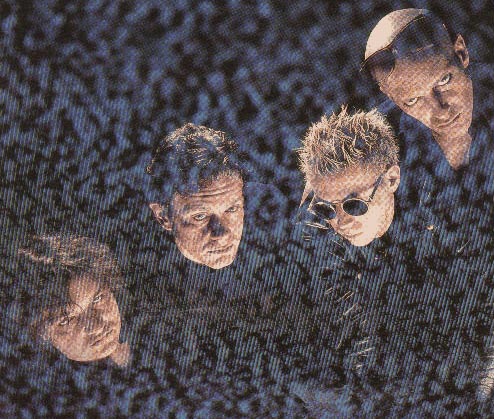
Scary monsters: KMFDM's Schulz, Connelly, Konietzko, En Esch (from left)
KMFDM make industrial music the old-fashioned way.
They trash their hardware.
by Jon Wiederhorn, in Rolling Stone Magazine

by Jon Wiederhorn, in Rolling Stone Magazine
SASCHA KONIETZKO, the nerve center of the electroindustrial group KMFDM, has quite a temper. A few days ago the computer printer in his Chicago home wouldn't stop jamming, but instead of consulting the instruction manual, the spiky-haired German kicked out a window and tossed the problematic component to its shattering death on the pavement below.
"I love to destroy things just for the fun of it," admits Konietzko with a laugh. "I'm like a little kid who tramples his toys, then wants new stuff.."
Konietzko has been trampling musical styles for more than 10 years, during which time KMFDM have evolved from an obscure concrete-bashing, art-terrorist outfit to a state-of-the-art industrial-rock band. On the group's latest album, Xtort, Konietzko lashes out with his most cohesive diatribes to date. Combining computerized beats and samples with blazing metallic riffs, soaring female background vocals and even a horn section on one track, KMFDM have assembled a collection of songs that range from the ecstatic dance-floor surge of "Power" to the apocalyptic, spoken-word electrolysis of"Dogma."
"I think we're taking this style of music into areas that [similar] bands are never going to go," Konietzko says, "because they gotta stay where they are in order to feel they're still industrial."
Like Nine Inch Nails, KMFDM are basically a one-man show fleshed out by a coterie of familiar names in the industrial music community. Xtort features two Ministry alumni, drummer William Reiflin and vocalist Chris Connelly, as well as guitarists Gtinter Schulz and Mark Durante, vocalist Dorona Alberti, Einstuerzende Neubauten percussionist F.M. Einheit, and the towering, bug-eyed, baldheaded multi-instrumentalist En Esch. Konietzko presides over his musicians with an iron fist, requiring them to be on call during recording sessions from 11 a.m. until midnight. "I don't care what they do on their own time," he says, "but when they do KMFDM, if they don't comply with the schedule, they're out." Konietzko is as hard on himself. When he's not in the studio, he wakes up at the very un-rock & roll hour of 9 a.m. and works on band business into the wee hours.
Konietzko's work ethic stems partially from his German upbringing. Born to an educated middle-class family in Hamburg, in 1961, he was still a child when his parents divorced. Since his mother wasn't financially secure, he spent his teens working menial jobs to help put food on the table. During those years, he took a lot of speed, drank too much and drifted aimlessly until a 1976 Sex Pistols gig gave him a renewed sense of purpose. "The next day I shaved off my hair and became a punk," Konietzko recalls, wit was a fucking revelation that made me think everybody can be up on that stage. You don't have to be David Bowie or T. Rex. You can just be a regular guy and play bass and destroy shit."
After bashing around in a few forgettable bands, Konietzko formed KMFDM in Paris in 1984 as a low-budget performance-art troupe. The group's initial lineup consisted of Konietzko and four Polish men he met in a whorehouse. Together the quintet hammered out improvised rhythms on sheet metal and air-conditioner ducts; soon thereafter, KMFDM expanded to a 20man operation that blew up TVs, performed fire-eating tricks and flung animal intestines at the audiences. The group continued as an inchoate form of onstage anarchy for a year before Konietzko met En Esch and re-formed KMFDM as a more structured unit.
Officially, KMFDM stands for Kein Mehrheit fur die Mitleid, a series of random words gathered from newspaper headlines, but according to industrial music folklore, the acronym is far more malicious. "A friend of ours came up one day and asked us as a joke if it stood for Kill Mother Fucking Depeche Mode," says Konietzko, "so we started telling people that's what it meant." He pauses, then asks, "Didn't that guy from Depeche Mode try to kill himself recently? It's all because of that."
After KMFDM moved from Germany to America in 1990, the group amassed a sizable following among fans of the burgeoning industrial genre. Nihil sold more than 120,000 copies, and Xtort has the potential to be this year's Pretty Hate Machine. Even so, Konietzko says that he's not an introverted industrial artiste who broods in the shadows of his tortured songs.
"I'm not tortured at all - I'm angry," Konietzko says. "But I'm laughing about it. When I wake up in the morning, I feel good. I feel like there's more wrenches to throw in the system and more bombs to drop on people's desks. So I just get ready, grab my cigarettes and go have fun."